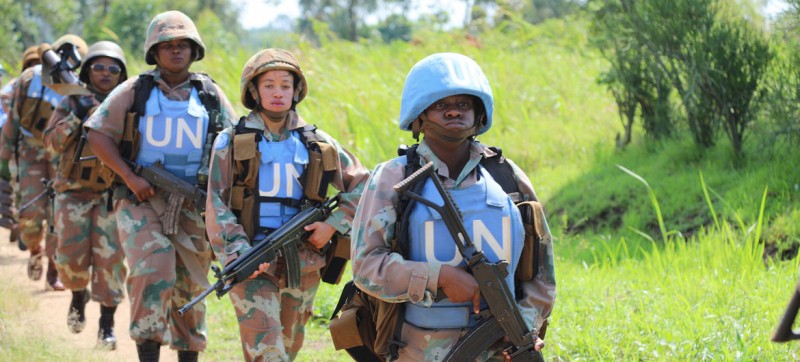Female peacekeepers from South Africa on patrol in the Democratic Republic of the Congo (file photo). A meeting to boost support for UN Peacekeeping ended on Wednesday with 62 countries making new pledges, and advancing existing commitments, to help enhance the performance and impact of these operations worldwide. They include measures to improve technology and provide extra medical capacity in the field – the cross-cutting themes of the 2021 Seoul UN Peacekeeping Ministerial, held virtually from the Republic of Korea.
Enhancing performance & safety of personnel are critical for our missions to protect civilians & pursue lasting peace. We continue to improve through A4P+ & commend Member States for their commitment, pol. support & valuable pledges. @ministerBZ @USAmbUN pic.twitter.com/x4XNhWOlrw
— Jean-Pierre Lacroix (@Lacroix_UN) December 8, 2021
The pledges are in line with the UN Secretary-General’s Action for Peacekeeping (A4P) initiative, and specifically within the seven priorities under the A4P+ implementation strategy to ramp up progress over the next two years.
Strong collective action
“Through strong partnership and collective action, UN Peacekeeping remains one of the most effective tools to respond to today’s peace and security challenges,” said Jean-Pierre Lacroix, head of the UN Department of Peace Operations (DPO).
“The strong political support and pledges we have received from Member States will help improve mandate delivery and support for our peacekeepers, who continue to make a tangible difference in the lives of millions of people each day.”
Some 75 countries, and two international organizations, took part in the two-day Seoul UN Peacekeeping Ministerial.
Thirty-six nations made commitments of new military and police capabilities, with some available for rapid deployment.
South Korea initiative
Host South Korea pledged to donate 16 helicopters to partner countries for use at UN missions. There are currently 12 operations worldwide, located in Europe, Africa, Asia and the Middle East.
The South Korean Government also announced the Seoul Initiative on Technology and Medical Capacity Building in Peacekeeping, to help UN Peacekeeping become more agile, data-driven and technology-enabled, and to enhance medical capacity in the face of the increasingly complex threats in higher-risk operating environments.
“Recalling our experience of recovering from the tragedies of the Korean War with the help of the UN and the international community, Korea is a living example of showing the world the fruits that can be borne through efforts made for peacekeeping,” said Chung Eui-yong, the country’s Foreign Minister.
“I hope the Seoul Initiative helps UN peacekeepers in defending peace, protecting vulnerable civilians, and achieving their goals and missions,” he added.
New partnerships, including training initiatives, were another key outcome of the meeting.
Nations helping nations
Some 45 countries committed to provide training opportunities, or announced capacity-building partnerships with other nations deploying troops and police to the field.
Member State pledges included efforts to strengthen the technology and medical capacity available to UN peacekeepers. Countries also affirmed their commitment to enhancing the role of women in peacekeeping, and to improving the UN’s environmental footprint.
In this regard, 18 countries pledged support to strengthen the UN’s medical capabilities, while 23 cited their ongoing efforts to increase the number of women ‘blue helmets’. Seven nations also made specific pledges to reduce the environmental footprint of their deployments to UN Peacekeeping.
Atul Khare, head of the UN Department of Operational Support (DOS), described partnerships as the “backbone” of peacekeeping.
“I was heartened by the many pledges to support ongoing established partnership initiatives and to forge new ones,” he said. “I remain committed to working with all stakeholders to deepen and strengthen our strategic and operational support partnerships for UN Peacekeeping and for those who need it most.”
The 2021 Seoul UN Peacekeeping Ministerial marked the latest in a series of meetings held since 2014 aimed at improving UN field operations.
Previous events were held in London, Vancouver and New York, where the last meeting took place two years ago.




Comments are closed.